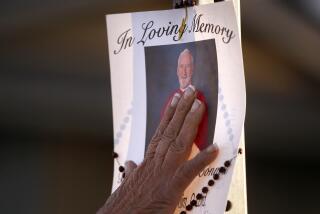Malachi Martin; Author, Former Jesuit Priest
- Share via
Malachi Martin, a former Jesuit priest turned author whose 15 novels and nonfiction books were critical of the Vatican and often revealed an obsession with Satanism, died Tuesday in New York. He was 78.
One of 11 children born in County Kerry, Ireland, to a British father and Irish mother, Martin was ordained in 1954. He studied theology at Louvain in Belgium, focusing on the Dead Sea Scrolls, and had a doctorate in Semitic languages, archeology and Asian history.
After working as an archeologist in the Middle East, he received an appointment to the Vatican in 1958, where he remained through the Second Vatican Council in the early 1960s, when the Roman Catholic Church adopted more liberal policies. He also taught at the Pontifical Biblical Institute in Rome and developed a close association with Pope John XXIII, who also had a deep interest in the Middle East.
A staunch traditionalist, Martin was opposed to modernization within his own order and left the Jesuits. In 1965 he moved to the United States, where he worked at a series of odd jobs, including waiter, taxi driver, longshoreman and painter, and devoted himself seriously to writing.
In his 1987 book, “The Jesuits: The Society of Jesus and the Betrayal of the Roman Catholic Church,” he described the battle between traditionalists and liberation theologians in the order founded by Ignatius of Loyola in 1540 and argued that it had become the opposite of what its founder had meant it to be.
The book received mixed reviews, called “immensely gripping” but too polemical by the National Review, where Martin was religion editor for several years.
He was also the author of “Hostage to the Devil,” a 1976 bestseller that purported to present case studies of five Americans possessed by the devil. He told The Times in 1976 that he became involved with exorcism after leaving the Jesuits and moving to New York. He said he had assisted in 11 exorcisms over the previous decade and filled the book with lurid and scatological detail.
The book jacket carried testimonials from respected figures, including Harvard theologian Harvey Cox, who called it a “stunning and vivid” work.
Most reviews took the book seriously, including the critique in the Washington Post, which called it “the most authoritative and convincing” of recent books on exorcism.
The New York Times and the Los Angeles Times, however, dismissed Martin’s work as unbelievable. William Peter Blatty, who wrote the best-selling “The Exorcist” and the screenplay for the 1973 movie of the same name directed by William Friedkin, gave “Hostage” a scathing review in the Los Angeles Times, assailing its accuracy as well as Martin’s style. “I loathe this book,” Blatty wrote. “It gives possession a bad name.”
Martin picked up the same theme in his 1996 novel “Windswept House,” which opened with a Black Mass in the Vatican. Reviewers saw the book as a thinly veiled commentary by Martin, who believed that Satan had set in motion a global conspiracy among world powers to erode the moral authority of the church. His characters included Vatican prelates who were Satanists.
“A lot of people don’t believe in the devil,” he once told the Chicago Tribune. “They shake their heads and say it’s a myth. I wish to God it was a myth.”
He was often compared to another former priest-cum-novelist, Andrew Greeley, although Greeley’s criticism of the church is based on more liberal leanings.
Martin was also the author of “The Encounter,” a 1970 study of Judaism, Christianity and Islam, and “The Final Conclave,” published in 1978, which made some shocking allegations involving alliances between the church and communist nations.
He is survived by a brother and four sisters.
More to Read
Sign up for our Book Club newsletter
Get the latest news, events and more from the Los Angeles Times Book Club, and help us get L.A. reading and talking.
You may occasionally receive promotional content from the Los Angeles Times.








